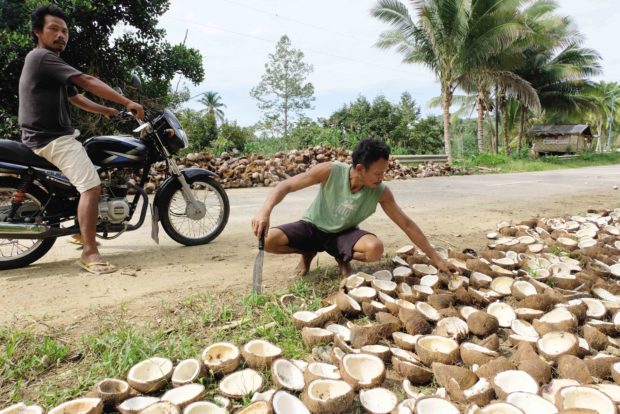‘Coconut farmers are grieving’

BARELY COPING A farmer dries coconuts on the road in Maitum town, Sarangani province. Thousands of coconut farmers in the province are struggling under the weight of low prices. —BONG S. SARMIENTO
MAITUM, Sarangani — Violeta Cuaresma, who owns a 1.3-hectare land devoted to coconut production, lives next to a store that buys coconut products. It has closed because of low prices.
Brando Paras, who maintains a 5-hectare coconut farm, stopped hiring workers to harvest nuts. He now just lets the nuts fall from the trees.
Cuaresma and Paras are just two of the thousands of residents of the province who depend on coconut production for their livelihood and are now barely making ends meet.
The culprit is plunging prices of copra, or dried coconut meat, which had gone down to as low as P15 per kilogram from nearly P40 per kilogram early this year.
Cuaresma, a 59-year-old widow, said she didn’t know when prices would stop falling. They fall every week, she said.
Rock bottom
While prices of copra haven’t reached rock bottom yet, the people who depend on it for a living already had.
Cuaresma, who got her 1-hectare farm in 1991 through the government’s agrarian reform program, said copra prices started to fall in September and had been falling on a weekly basis.
The suffering was made more painful by thoughts about Christmas, Cuaresma said.
“It will be a blue Christmas for coconut farmers,” she said.
Paras said he could no longer afford to pay workers to harvest his nuts because, while copra prices had fallen, workers’ salaries had not.
Where Paras lived in Kiamba town, copra prices have fallen to P13 per kilogram.
Cuaresma said she was scheduled to harvest her nuts this month but postponed it hoping prices would improve.
Rotting nuts
But Cuaresma might end up like hundreds of other farmers whose nuts are now rotting while waiting for prices to increase.
The dependence on coconut was nearly total for many residents.
Some farm owners sell nuts per piece and pay for labor to harvest the nuts and transportation to bring the nuts to copra processors who turn the product into desiccated coconut.
Even prices of whole nuts had been plunging, according to Cuaresma.
Before, nuts could fetch P12 each, but now they were only worth P4 per piece, said Cuaresma, who also operated a small eatery at the Maitum town center to add to her income.
Romula dela Rosa, administrator of the Philippine Coconut Authority, had said oversupply in the global coconut market pulled prices down to a “crisis point.”
National crisis
In October, he said nationwide average farm-gate price of copra had fallen to P19 per kilogram from P37 per kilogram last year.
Dela Rosa said the industry needed government help badly as the estimated 5 million families dependent on the coconut industry were already struggling under the weight of drastically lower prices.
But Cuaresma said farmers had not received any help from the government.
Mariano Encarnacion, who maintains a hectare of coconut farm in Maitum, said he was shocked by the sharp decline in coconut prices.
When prices were better, the 40-year-old father of four said he could earn at least P10,000 a month.
To cope, Encarnacion said he just allowed the nuts to become seedlings, which he sold for P7 per piece to other farmers.
“Coconut farmers are grieving,” he said.